|
|
|
Sort Order |
|
|
|
Items / Page
|
|
|
|
|
|
|
| Srl | Item |
| 1 |
ID:
196964


|
|
|
|
|
| Summary/Abstract |
International attention toward energy transition has seen significant growth recently. Each region has focused on some of its aspects according to its own context. Our work focuses on African countries and analyses their energy transition. Our study adds to the literature on energy transition studies by understanding the energy landscape of African countries and identifying similarities and differences between them using a cluster analysis based on a multivariate Euclidean distance measure. Thanks to this measure, we highlighted four clusters. We discuss how these clusters are explained by similar economic, political and cultural factors. The cluster that uses the most RE (Green-Cluster) has low political stability and high foreign direct investment, suggesting that RE can be an opportunity to attract investors and enhance green economic development. Countries of cluster that show high FF consumption (Brown-cluster), have high CO2 emissions but better economic and social situations. Lastly, we proposed diverse policy implications for the different clusters, offering a range of indications aimed at advancing specific Sustainable Development Goals. It is necessary to focus on developing strategies to leverage RE and enhance governance for countries of Green-Cluster. For Brown-cluster, they should accelerate the transition to cleaner energy sources to combat climate change.
|
|
|
|
|
|
|
|
|
|
|
|
|
|
|
|
| 2 |
ID:
171365
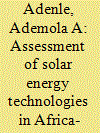

|
|
|
|
|
| Summary/Abstract |
Renewable energy sources like solar energy have an important role to play towards the implementation of the 2030 agenda and Sustainable Development Goals (SDGs) in Africa. While renewable energy was not stated as one of the technologies for the achievement of the Millennium Development Goals (MDGs), it played an indirect role towards meeting MDG targets especially in the areas such as household application, health, education and poverty reduction in Africa. However, renewable energy's impacts (including solar energy technologies) were not quantified, and lack of performance assessment could be in part attributed to the weak implementation of solar energy projects in the developing world including countries in Africa. The aim of this paper is to conduct meta-analysis of the literature on the performance of solar energy technologies in order to determine solar energy adoption trends in African countries. This is supplemented with expert interviews and data gathered from the World Bank/Global Environment Facility. Using three case studies of Ghana, Kenya and South Africa, this paper examines the benefits and challenges that are associated with the application of solar energy technologies for meeting SDGs in Africa. Finally, the paper concludes by highlighting the policy implication for the application of solar energy technologies.
|
|
|
|
|
|
|
|
|
|
|
|
|
|
|
|
| 3 |
ID:
167574


|
|
|
|
|
| Summary/Abstract |
In the 1980s, the process of convergence between culture and development began to emerge in the context of post-colonialism and changing geopolitical realities. Later on, along with increasing multilateralism, The United Nations Educational, Scientific and Cultural Organization (UNESCO) eventually became the main actor in promoting culture as a fourth pillar of sustainable development. The paradigm shift in the heritage-development agenda is examined in the context of growing aspirations of non-Western states to play an active role in the global heritage regime, and the interests and strategies of UNESCO’s secretariat and the member states. At first, heritage and development were perceived as separate or opposed fields. Recently, a sustainable development framework emerged as a new global development model. UNESCO has engaged in the shaping of the United Nations (UN) 2030 agenda, and advocated a pragmatic approach to heritage. This paper examines the evolution of ideas and concepts linking ‘development’ and ‘heritage’ forged at the forum of UNESCO as part of its Culture and Development framework. The role of the Global South in the paradigm change is highlighted.
|
|
|
|
|
|
|
|
|
|
|
|
|
|
|
|
| 4 |
ID:
158641
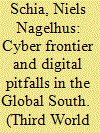

|
|
|
|
|
| Summary/Abstract |
How does digitalisation lead to new kinds of global connections and disconnections in the Global South? And what are the pitfalls that accompany this development? Much of the policy literature on digitalisation and development has focused on the importance of connecting developing countries to digital networks. Good connection to digital networks may have a fundamental impact on societies, changing not only how individuals and businesses navigate, operate and seek opportunities, but also as regards relations between government and the citizenry. However, the rapid pace of this development implies that digital technologies are being put to use before good, functional regulatory mechanisms have been developed and installed. The resultant shortcomings – in state mechanisms, institutions, coordination mechanisms, private mechanisms, general awareness, public knowledge and skills – open the door to new kinds of vulnerabilities. Herein lie dangers, but also opportunities for donor/recipient country exchange. Instead of adding to the already substantial literature on the potential dividends, this article examines a less studied issue: the new societal vulnerabilities emerging from digitalisation in developing countries. While there is wide agreement about the need to bridge the gap between the connected and the disconnected, the pitfalls are many.
|
|
|
|
|
|
|
|
|
|
|
|
|
|
|
|
| 5 |
ID:
153137
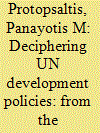

|
|
|
|
|
| Summary/Abstract |
A comparative analysis of the United Nations (UN) resolutions on the development decades reveals an evolution of the UN policies: a gradual shift from the modernisation paradigm to the human development approach, even though the goal of economic growth was never entirely abandoned. Despite this evolution, all relevant resolutions define quantitative targets on inputs and outputs to be met through recommended policy measures involving state intervention in the economy and the society, introduced into developing countries’ plans for development, in accordance with the teachings of the modernisation paradigm.
|
|
|
|
|
|
|
|
|
|
|
|
|
|
|
|
| 6 |
ID:
139598
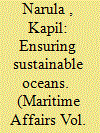

|
|
|
|
|
| Summary/Abstract |
Ensuring sustainable oceans and seas is vital for the well-being of the planet. However, oceans – which are the largest ecosystems – are degrading rapidly, which is a cause of anxiety. The paper presents some of the growing concerns about the health of the oceans and analyses three main drivers of ocean degradation, viz. overexploitation for resources, unintended impacts of anthropogenic activities and weak governance structures. Some of the ongoing work on adopting Sustainable Development Goals (SDGs) for the oceans, and by the Biodiversity Beyond National Jurisdiction (BBNJ) working group for governance of the “high seas”, are then discussed. The paper suggests a way ahead and proposes that India should play a larger role in the ongoing discussions. The paper concludes that there is a need for international cooperation and global support, and ensuring sustainable oceans is the key to sustainable development.
|
|
|
|
|
|
|
|
|
|
|
|
|
|
|
|
| 7 |
ID:
171085
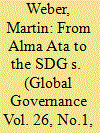

|
|
|
|
|
| Summary/Abstract |
The Alma Ata Declaration of 1978 proclaimed “health for all by the year 2000.” In 2019 health is mainstreamed through the United Nations’ 2030 Sustainable Development Goals (SDG s) initiative. Contributing to critical analysis of global health governance (GHG), this article reconstructs the normative premises of the Alma Ata Declaration, the political project it represented, and the successful cases it was inspired by. It contrasts this with an account of the emergence and gradual consolidation of the GHG agenda that is today reflected in the SDG s. The calls for a return to the Alma Ata Declaration resonate strongly among human rights advocates, community activists, and the medical profession. This is because of the socially exclusionary effects of the dominant health governance agenda shaped by distinctively neoliberal premises. The article argues that in the final analysis the two different approaches reflect very different ideas and ideals about “who global health governance is for.”
|
|
|
|
|
|
|
|
|
|
|
|
|
|
|
|
| 8 |
ID:
164938
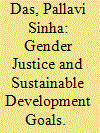

|
|
|
|
|
| Summary/Abstract |
The roots of gender injustices can be traced back into the formal and informal membership of various social institutions that is family, the community, the market, the state, and even the institutions of established by religion. In one or another, these institutions are supposed to settle disputes, establish and enforce legal rules, and prevent the abuse of power.
|
|
|
|
|
|
|
|
|
|
|
|
|
|
|
|
| 9 |
ID:
161642
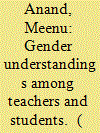

|
|
|
|
|
| Summary/Abstract |
Gender issues are of paramount interest in school education in India, but questions remain about what girls and boys actually learn about gender once they are in school. Are schools really places where teachers effectively combat traditional gender stereotypes among students? Relying on primary research in schools in Delhi, this article examines teachers’ biases and stereotypes regarding gender issues. Comparing this grassroots reality to the opinions on masculinity and femininity held by children in the same schools, the article identifies a need for more focused teacher education. The persistent gaps between tall claims about improved gender awareness, ambitious promises in policies and existing ground realities pose significant educational challenges for India, especially with regard to methods of promoting consciousness about gender-related issues in all domains of education.
|
|
|
|
|
|
|
|
|
|
|
|
|
|
|
|
| 10 |
ID:
185501
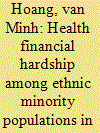

|
|
|
|
|
| Summary/Abstract |
This study was conducted to report the prevalence of financial hardship and identify associated factors among ethnic minority populations in Vietnam. In 2019, we conducted a cross-sectional study of 5,033 ethnic minority participants from 12 provinces located in four socioeconomic regions in Vietnam. Financial hardship was measured by asking the study respondents if they had to borrow money, sell household assets, or stop using health care services due to health care service fees. Among the health service users, 24.0% (95% CI: 22.3–25.8%) faced a health-related financial hardship. Participants with secondary education were more likely to experience financial hardship than illiterate participants. In contrast, those who were able to speak the Vietnamese language, had a religious affiliation, or had health insurance were likely to have lower financial hardship. Continuing to expand health insurance coverage and develop essential packages covered by health insurance is vital to reducing financial hardship.
|
|
|
|
|
|
|
|
|
|
|
|
|
|
|
|
| 11 |
ID:
190597
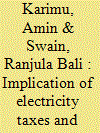

|
|
|
|
|
| Summary/Abstract |
The current high electricity prices in the European Union (EU) are in part due to the high electricity taxes. United Nations’ Sustainable Development Goals (SDGs) Agenda with its global vision of attaining sustainable development especially seeks “to ensure universal access to affordable, reliable and modern energy services” (SDG 7). We investigate the synergy and trade-off effects of electricity taxes on sustainable development goals (SDGs) for the EU. Using panel data and panel vector autoregressive estimation approach, we find that higher household electricity taxes reduce both carbon emission and unemployment. Higher levels of industry electricity taxes, increase responsible production and consumption (SDG12) and reduces unemployment (SDG8). Furthermore, there is evidence for a strong synergy effect between electricity taxes, unemployment and carbon emission but a trade-off between tax and SDG9 (innovation and sustainable infrastructure). The taxes contribute more to the future variation of unemployment and responsible production and consumption in the EU, but these contributions are much larger for the industry as compared to the household sector. Our results confirm the double-dividend hypothesis, which implies that the policymakers can achieve environmental goals with higher electricity taxes, especially on household electricity. In the industrial sector, our findings suggest that there is a need for tax reform, to encourage innovation and adopt production processes that are less polluting to the environment.
|
|
|
|
|
|
|
|
|
|
|
|
|
|
|
|
| 12 |
ID:
195124


|
|
|
|
|
| Summary/Abstract |
This article examines the potential impact of India’s Act East Policy on the food systems of the Konyak Nagas, an indigenous community in Nagaland. The article studies how the traditional knowledge of the Konyak Nagas about the land, labour and ecology has influenced their food culture. The communal landholdings, shifting cultivation, natural preservation of food items, manual labour in agricultural lands and chemical-free fertilisation process have so far kept the Konyaks self-sufficient in terms of requirement of food, and kept the market forces at bay. Emphasising the significance of food security in the changing global scenario in the post-pandemic period and considering the UN’s Sustainable Development Goals, the article explores how Act East Policy’s capitalistic rationalisation of resources may significantly affect their sustainable means of subsistence and appropriate their farms and platters, which are an integral element of the cultural fabric of the community.
|
|
|
|
|
|
|
|
|
|
|
|
|
|
|
|
| 13 |
ID:
144264
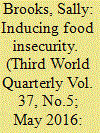

|
|
|
|
|
| Summary/Abstract |
The G7 ‘New Alliance for Food Security and Nutrition’ follows an established approach of ‘connecting smallholder farmers to markets’, while extending the role and influence of corporate agri-business in new ways. This paper explores the implications of the ‘New Alliance’ model’s incorporation into the Sustainable Development Goals framework for smallholder producers already facing greater uncertainty in financialised agri-food chains, and in light of a consensus around the primacy of private finance in the post-2015 era. The question for alternative food and development movements is how to confront the ‘value chain challenge’ in an increasingly financialised global agri-food system.
|
|
|
|
|
|
|
|
|
|
|
|
|
|
|
|
| 14 |
ID:
173905
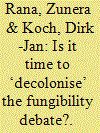

|
|
|
|
|
| Summary/Abstract |
Recent literature has established that development assistance is often fungible and that this is undesirable. In line with current efforts to ‘decolonise development studies’, we critically reflect on the underlying assumptions of this line of thinking. We establish a framework that differentiates between potential positive and negative fungibility. We hypothesise that recipient governments can redirect their own funds and achieve positive fungibility, if (1) the marginal value added in the alternative target sector/region is higher; (2) equity concerns are adequately addressed when other sectors/regions are supported; and (3) temporal delay helps to cushion instability of aid flows. There are indications that this positive fungibility might be quite prevalent. Future fungibility research should therefore no longer assume that fungibility is in itself undesirable.
|
|
|
|
|
|
|
|
|
|
|
|
|
|
|
|
| 15 |
ID:
189314
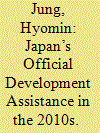

|
|
|
|
|
| Summary/Abstract |
Japanese aid has been continuously criticized as its modalities are focused on economic infrastructure via loans. However, support for economic growth and infrastructure has become more important due to the growing influence of recipient needs and emerging donors. Accordingly, Japan’s perception and implementation of its aid in the changing international regime in the 2010s are a salient factor. This study clarifies the common and different features between the official development assistance before the 1990s and the 2010s to identify which characteristics “returned” from the “Japan model” in the past. The domestic background and factors were examined to explain the alteration concentrated on the meaning of aid in the Abe administration’s policy directions and domestic actors. The results indicate the aid modalities in the 2010s are similar to the aid in the 1980s in some aspects, putting emphasis on economic growth, infrastructure, and cooperation with private sectors. But “quality growth” came into the slogan in the 2010s, as Japan is not the largest donor anymore. The Prime minister’s office (Kantei) led the aid policy as a part of priority policy “Abenomics” to support the prime minister in the 2010s, while collaborations among Liberal Democratic Party members, bureaucrats, and private actors led the aid policy in the 1980s.
|
|
|
|
|
|
|
|
|
|
|
|
|
|
|
|
| 16 |
ID:
176483
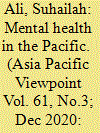

|
|
|
|
|
| Summary/Abstract |
The Pacific region faces a significant and growing burden of noncommunicable diseases and mental disorders. An emerging issue is the increasing overlap between physical and mental health conditions, which are often the result of interactive effects and lead to more severe consequences. In addition, climate change is amplifying health risks, as it poses both physical and existential threats to Pacific Island communities. The sustainable development agenda provides a holistic opportunity to address these issues; key elements include improving health surveillance and strengthening health systems, within a multisectoral approach, in order to work towards achieving Healthy Islands.
|
|
|
|
|
|
|
|
|
|
|
|
|
|
|
|
| 17 |
ID:
166139
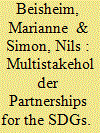

|
|
|
|
|
| Summary/Abstract |
In the 2030 Agenda for Sustainable Development, the United Nations assigned an important role to multistakeholder partnerships for implementing the Sustainable Development Goals. Since partnerships show a mixed success record, this article analyzes whether relevant actors in the UN context are inclined to translate lessons learned and the increased knowledge about partnerships’ conditions for success into an improved “UN metagovernance.” Criticizing the current institutional setup, most of the interviewed actors proposed that partnerships should be metagoverned by the UN through systemwide principles, rules, and procedures. There is, however, little consensus as to how that should be done. Drawing on assumptions from the literature and extensive empirical research, the article identifies patterns in actors’ perspectives on the issue.
|
|
|
|
|
|
|
|
|
|
|
|
|
|
|
|
| 18 |
ID:
141935
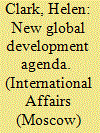

|
|
|
|
|
| Summary/Abstract |
IN THE COMING MONTHS in New York, United Nations member states are expected to agree on a new development agenda which will replace that of the Millennium Development Goals (MDGs). It is shaping up to be an ambitious and transformational development agenda, which would be universal in nature, cover all three dimensions of sustainable development, and aim to address the many interlinked challenges our world is facing. The agenda is relevant to countries at all stages of development.
|
|
|
|
|
|
|
|
|
|
|
|
|
|
|
|
| 19 |
ID:
193240
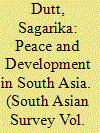

|
|
|
|
|
| Summary/Abstract |
South Asia has been recognised by the World Bank as an important region in the Global South. It has achieved robust economic growth over the past 20 years which has helped in reducing poverty and improving standards of human development. On the other hand, 36% of the world’s poor live in South Asia, so a lot more needs to be done. This article argues that South Asian countries need peace and stability in order to be able to concentrate on their economic development and achieve the UN’s Sustainable Development Goals. Centuries of colonial rule had led to the impoverishment of the South Asian region and its people. It also created two states, India and Pakistan, that have never had good relations with each other. This has had an impact on regional cooperation and prevented the countries in the region from working together to achieve their developmental goals. The article concludes that while the region needs to sustain high economic growth rates, it does not automatically lead to the reduction of poverty. Other measures have to be adopted to promote the welfare of the people of South Asia.
|
|
|
|
|
|
|
|
|
|
|
|
|
|
|
|
| 20 |
ID:
173970
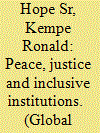

|
|
|
|
|
| Summary/Abstract |
The SDGs are intended to be universal, in the sense of global applicability. Goal 16 of the 2030 Agenda for Sustainable Development is officially titled: ‘Promote peaceful and inclusive societies for sustainable development, provide access to justice for all and build effective, accountable and inclusive institutions at all levels’. This article provides an analysis of the importance of SDG 16 to achieving all of the SDGs, the progress on implementation of SDG 16 to date, the principal challenges that countries are encountering in the implementation of SDG 16, and proposes a set of policy solutions to overcome those challenges. It argues that progress on SDG 16 is critical to progress on the other SDGs and, therefore, it is imperative that countries vigorously attempt to overcome those challenges to meet the targets indicated for each goal. It draws on country experience as well as on the author’s own field experience.
|
|
|
|
|
|
|
|
|
|
|
|
|
|
|
|
|
|
|
|
|